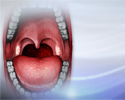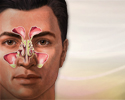Scarlet fever
Scarlatina; Strep infection - scarlet fever; Streptococcus - scarlet feverScarlet fever is caused by an infection with bacteria called group A streptococcus. This is the same bacteria that cause strep throat.
Strep throat
Strep throat is a disease that causes a sore throat (pharyngitis). It is an infection with a bacteria called group A streptococcus.

Causes
Scarlet fever used to be a severe childhood disease. The group A strep bacteria produce a toxin that causes a distinctive red rash, which led to the name.
Rash
Rashes involve changes in the color, feeling or texture of your skin.

The main risk factor for getting scarlet fever is infection with the bacteria that cause strep throat. An outbreak of strep throat or scarlet fever in the community, neighborhood, or school may increase the risk of infection.
Symptoms
The time between infection and symptoms is short, most often 1 to 2 days. The illness will likely begin with a fever and sore throat.
Fever
Fever is the temporary increase in the body's temperature in response to a disease or illness. A child has a fever when the temperature is at or abov...

The rash first appears on the neck and chest, then spreads over the body. People say it feels like sandpaper. The texture of the rash is more important than the appearance to confirm the diagnosis. The rash can last for more than a week. As the rash fades, the skin around the fingertips, toes, and groin area may peel.
Other symptoms include:
- Abdominal pain
Abdominal pain
Abdominal pain is pain that you feel anywhere between your chest and groin. This is often referred to as the stomach region or belly.
 ImageRead Article Now Book Mark Article
ImageRead Article Now Book Mark Article - Bright red color in the creases of the underarm and groin
- Chills
Chills
Chills refers to feeling cold after being in a cold environment. The word can also refer to an episode of shivering along with paleness and feeling ...
 ImageRead Article Now Book Mark Article
ImageRead Article Now Book Mark Article - Fever
- General discomfort (malaise)
- Headache
Headache
A headache is pain or discomfort in the head, scalp, or neck. Serious causes of headaches are rare. Most people with headaches can feel much better...
 ImageRead Article Now Book Mark Article
ImageRead Article Now Book Mark Article - Muscle aches
Muscle aches
Muscle aches and pains are common and can involve more than one muscle. Muscle pain also can involve ligaments, tendons, and fascia. Fascias are th...
 ImageRead Article Now Book Mark Article
ImageRead Article Now Book Mark Article - Sore throat
- Swollen, red tongue (strawberry tongue)
- Vomiting
Exams and Tests
Your health care provider may check for scarlet fever by doing a:
- Physical examination
- Throat culture that shows bacteria from group A streptococcus
Throat culture
A throat swab culture is a laboratory test that is done to identify germs that may cause infection in the throat. It is most often used to diagnose ...
 ImageRead Article Now Book Mark Article
ImageRead Article Now Book Mark Article - Throat swab to do a test called rapid antigen detection for group A streptococcus ("rapid strep test")
Treatment
Antibiotics are used to kill the bacteria that cause the throat infection. This is crucial to prevent rheumatic fever, a serious complication of strep throat and scarlet fever.
Outlook (Prognosis)
With proper antibiotic treatment, the symptoms of scarlet fever should get better quickly. However, the rash can last for up to 2 to 3 weeks before it fully goes away.
Possible Complications
Complications are rare with the right treatment, but may include:
- Acute rheumatic fever, which can affect the heart, joints, skin, and brain
Rheumatic fever
Rheumatic fever is a disease that may develop after an infection with group A streptococcus bacteria (such as strep throat or scarlet fever). It can...
Read Article Now Book Mark Article - Ear infection
- Kidney damage
- Liver damage
- Pneumonia
Pneumonia
Pneumonia is a breathing (respiratory) condition in which there is an infection of the lung. This article covers community-acquired pneumonia (CAP). ...
 ImageRead Article Now Book Mark Article
ImageRead Article Now Book Mark Article - Sinus infection
Sinus infection
Sinusitis is present when the tissue lining the sinuses become swollen or inflamed. It occurs as the result of an inflammatory reaction or an infect...
 ImageRead Article Now Book Mark Article
ImageRead Article Now Book Mark Article - Swollen lymph glands or abscess
Abscess
An abscess is a collection of pus in any part of the body. In most cases, the area around an abscess is swollen and inflamed.
 ImageRead Article Now Book Mark Article
ImageRead Article Now Book Mark Article
When to Contact a Medical Professional
Contact your provider if:
- You develop symptoms of scarlet fever
- Your symptoms do not go away 24 hours after beginning antibiotic treatment
- You develop new symptoms
Prevention
Bacteria are spread by direct contact with infected people, or by droplets an infected person coughs or exhales. Avoid contact with infected people.
References
Bryant AE, Stevens DL. Streptococcus pyogenes. In: Bennett JE, Dolin R, Blaser MJ, eds. Mandell, Douglas, and Bennett's Principles and Practice of Infectious Diseases. 9th ed. Philadelphia, PA: Elsevier; 2020:chap 197.
Michaels MG, Williams JV. Infectious diseases. In: Zitelli BJ, McIntire SC, Nowalk AJ, Garrison J, eds. Zitelli and Davis' Atlas of Pediatric Physical Diagnosis. 8th ed. Philadelphia, PA: Elsevier; 2023:chap 13.
Shulman ST, Reuter CH. Group A streptococcus. In: Kliegman RM, St Geme JW, Blum NJ, Shah SS, Tasker RC, Wilson KM, eds. Nelson Textbook of Pediatrics. 21st ed. Philadelphia, PA: Elsevier; 2020:chap 210.
Stevens DL, Bryant AE, Hagman MM. Nonpneumococcal streptococcal infections and rheumatic fever. In: Goldman L, Cooney KA, eds. Goldman-Cecil Medicine. 27th ed. Philadelphia, PA: Elsevier; 2024:chap 269.
Signs of scarlet fever - illustration
Scarlet fever is a disease caused by an infection with group A beta-hemolytic streptococcal bacteria that occurs in a small percentage of people with strep throat. The illness typically begins with a fever and sore throat. It may be accompanied by chills, vomiting, abdominal pain and malaise. The streptococcal bacteria produces a toxin that causes a rash that appears one to two days after the onset of illness. The rash initially appears on the neck and chest, then spreads over the body. While the rash is still red, the patient may develop Pastia's lines, bright red coloration of the creases under the arm and in the groin.
Signs of scarlet fever
illustration
Signs of scarlet fever - illustration
Scarlet fever is a disease caused by an infection with group A beta-hemolytic streptococcal bacteria that occurs in a small percentage of people with strep throat. The illness typically begins with a fever and sore throat. It may be accompanied by chills, vomiting, abdominal pain and malaise. The streptococcal bacteria produces a toxin that causes a rash that appears one to two days after the onset of illness. The rash initially appears on the neck and chest, then spreads over the body. While the rash is still red, the patient may develop Pastia's lines, bright red coloration of the creases under the arm and in the groin.
Signs of scarlet fever
illustration
Review Date: 2/8/2024
Reviewed By: Linda J. Vorvick, MD, Clinical Professor, Department of Family Medicine, UW Medicine, School of Medicine, University of Washington, Seattle, WA. Also reviewed by David C. Dugdale, MD, Medical Director, Brenda Conaway, Editorial Director, and the A.D.A.M. Editorial team.

